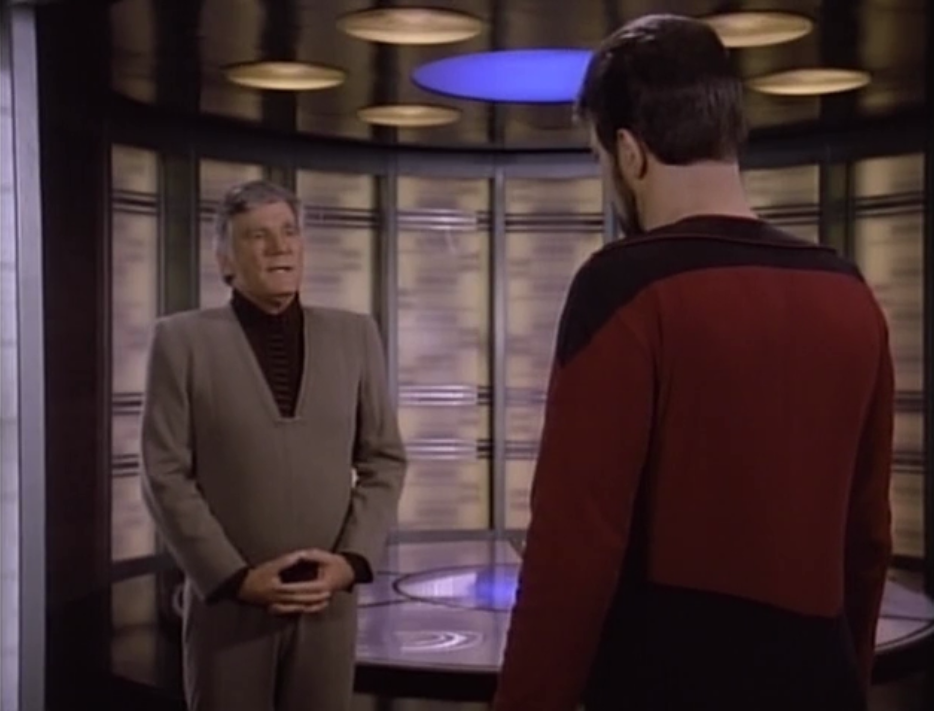Memory Alpha summary
 |
| via Let's Watch Star Trek All the other memorable shots involve either Klingon painsticks (yay!) or stuff that kind of resembles Tron. So I went with this one. |
And it introduces Riker's dad. Who at one point actually looks far more significant to Pulaski.
And it is, until "The Best of Both Worlds," the most prominent exploration of why Riker stays onboard the Enterprise rather than accepting his own command.
On these two scores, then, I call the episode problematic. As psychological insight goes, it's rarely a bad thing to see where exactly a character came from. What made Riker than man we know? Apparently a father who actively competed with him, but who failed in forming a decent relationship with him because both of them were grieving the death of Riker's mom. And they're more alike than they'd like to admit. That sort of stuff.
Which is all well and good. Except Riker's dad becomes a complete nonfactor in the rest of the series. A series that repeatedly returned to Troi's dear old mum (yay!), even introduced every conceivable member of Data's "family," and just about anyone else you could imagine as relevant to a series that otherwise spent a minimum amount of time in the day-to-day lives of its characters. That's got to count for something, right? That Riker's dad leaves an uncomfortable legacy? That a season that to this point had looked like the best possible showcase for Riker turns in an episode like this?
And about that promotion deal. Part of the problem of an ensemble is wanting that ensemble together together as long as possible. Next Generation kept its ensemble as relatively intact as possible. This meant Riker was never going to leave the series except under very unlikely circumstances. So to draw attention to the likelihood and the in-universe reality of this situation not once but several times (the earliest such moment actually coming in the first season!) brings with it a different set of specifications for legacy potential. And actually, "Icarus" is a more nuanced view of it than "Best of Both Worlds." But there's no competing with "Best of Both Worlds." There just isn't.
So where does that leave the episode? How does it fail if it seems to go to great lengths to expand the boundaries of what the series typically does, before during and after this moment in its run? Again, the answer is in the series itself. Riker's dad is never seen again. The writers were scared enough to pursue the notion of Riker and Troi's romance (which finally culminates in Star Trek Nemesis, released more than a decade after this episode). Which is to say, the implications of this episode are...problematic. There's every chance you can consider it as a bold character statement. And there's also the chance, the more cautious one, that "Icarus" makes a strong character look uncharacteristically weak. And that's what family tends to do, right? Except when it happens to Troi, there's never such a dilemma. The series owns that relationship. This one looks like it was culled from a soap opera.
I don't know. This is the kind of experience that demonstrates the birthing pains the series undoubtedly was still experiencing. For everything the second season did right, there's a reason the third season was still necessary to do everything...more right. "Icarus Factor" might be considered to be the episode, more than any other, where this can be seen playing out.
four quarter analysis
notable guest-stars:
Diana Muldaur
Colm Meaney
Mitchell Ryan
John Tesh

No comments:
Post a Comment